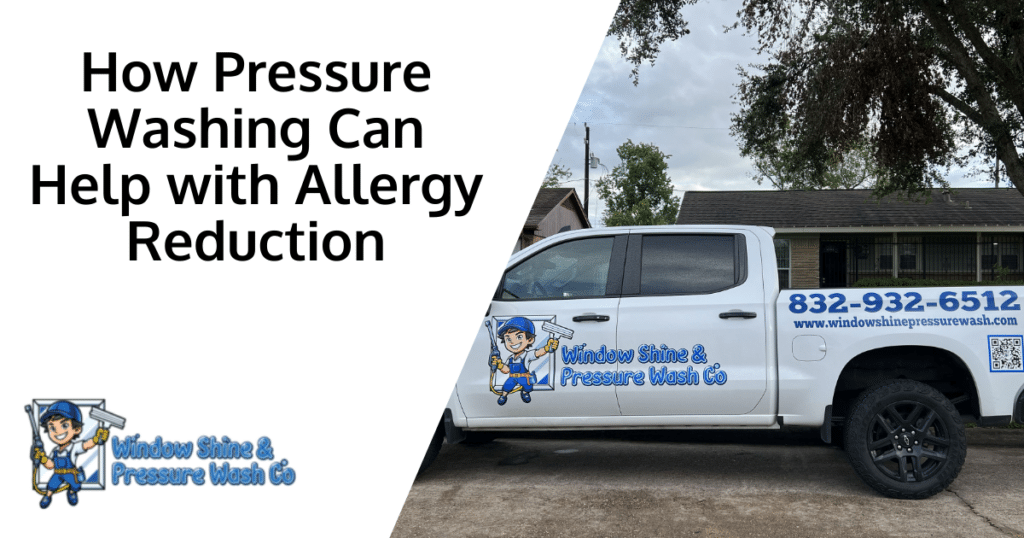should be avoided during the pressure washing process?
Understanding Pressure Washing and Its Role in Allergy Reduction
What is Pressure Washing?
Pressure washing is a cleaning method that utilizes high-pressure water spray to remove dirt, grime, mold, loose paint, dust, mud, and other unwanted substances from surfaces and objects. This technique is commonly employed in various cleaning scenarios, including residential, commercial, and industrial applications. It operates on the principle of pressure, in which water is forced against surfaces to dislodge contaminants.
This cleaning method is distinct from other techniques due to its ability to penetrate hard-to-reach areas and effectively remove stubborn stains. It is particularly effective on diverse surface types, such as concrete, brick, and wood, offering a comprehensive cleaning solution. Different types of equipment–namely pressure washer machines–are utilized to produce the high-pressure water spray needed for cleaning.
How Allergens Accumulate in Outdoor Spaces
Allergens, substances that trigger allergic reactions in sensitive individuals, are commonly found in outdoor environments. Examples of these outdoor allergens include pollen, mold, dust mites, and animal dander. These allergens can accumulate on surfaces including driveways, decks, and patios, posing health risks for individuals with allergies.
Allergens build up on outdoor surfaces primarily through natural phenomena such as wind, but also via human and animal activity. Over time, these allergens can accumulate to levels that may significantly impact individuals with certain allergic conditions. Therefore, regular allergen control measures, such as pressure washing, are essential for homeowners.
The Benefits of Pressure Washing for Allergy Reduction
Effective Removal of Allergens
Pressure washing can be an effective way to remove allergens from outdoor surfaces. This is because the high pressure can dislodge elements such as pollen, mold, and mildew, which are commonly known allergens. By eliminating these allergens, pressure washing helps to improve the air quality around outdoor living spaces, in turn, benefiting individuals who may suffer from allergies.
Furthermore, pressure washing is particularly effective on hard surfaces such as concrete or wood, where allergens are more likely to accumulate. Regular pressure washing, therefore, plays a crucial role in reducing allergic reactions triggered by these substances.
Enhanced Outdoor Living Experience
A clean and allergen-free outdoor space can greatly enhance the living experience, especially for individuals with allergies. This is because less exposure to allergens results in fewer allergic reactions, enhancing overall comfort and health. Furthermore, clean outdoor spaces are more enjoyable for activities such as family gatherings and outdoor games. Regular maintenance of outdoor spaces through practices like pressure washing can thus contribute significantly to allergy management.
Preserving Property Value and Aesthetic Appeal
Regular pressure washing not only eliminates allergens but also contributes significantly to preserving the visual appeal and value of your property. Dirt, grime, and stains can degrade your property’s exterior over time; pressure washing eliminates these, giving your property a well-maintained and appealing look. Regular maintenance of this nature could be particularly attractive to potential buyers who have allergy concerns— presenting a neat and allergen-reduced environment adds to your home’s appeal.
DIY Pressure Washing vs. Professional Services
Comparing Effectiveness and Cost
While DIY pressure washing may seem cost-effective, it’s important to consider usability, safety, and effectiveness. Buying or renting pressure washing equipment can be an investment in itself, plus there’s a learning curve when it comes to its use. On the other hand, professional services come with the convenience of expertise, experience, and potentially a higher level of effectiveness in eliminating allergens.
When to Hire a Professional
Knowing when to call in professionals is an important consideration when dealing with pressure washing. Signs may include complex cleaning jobs, vast amounts of allergen accumulation, or delicate materials that could be damaged by incorrect pressure washing techniques. Professionals are equipped with better knowledge of these constraints, making their services potentially more reliable in these cases.
Steps and Tips for Effective Pressure Washing
Preparing for Pressure Washing
Proper preparation is key for effective and safe pressure washing. This includes selecting the right equipment, putting in place necessary safety measures, and considering environmental factors. Areas should be cleared of moveable items, plants should be protected, and necessary safety gear should be worn when conducting pressure washing.
Executing the Process Safely and Efficiently
Proper execution of the pressure washing process ensures that allergens and other impurities are effectively removed without incurring damage to surfaces. One should be aware of the pressure setting to be used for different surfaces, the correct handling of the equipment, and the method to efficiently remove the allergens. Being aware of common mistakes can prevent damage to surfaces and ineffective cleaning.

